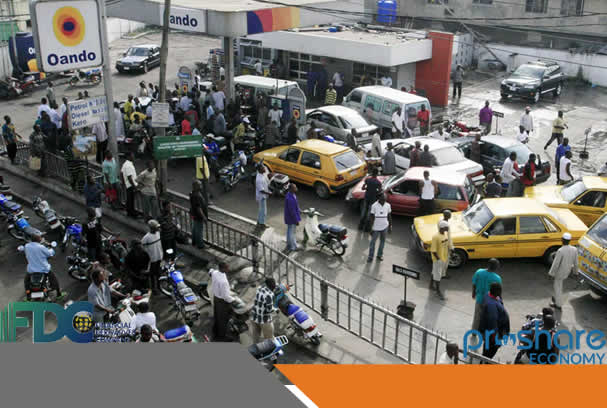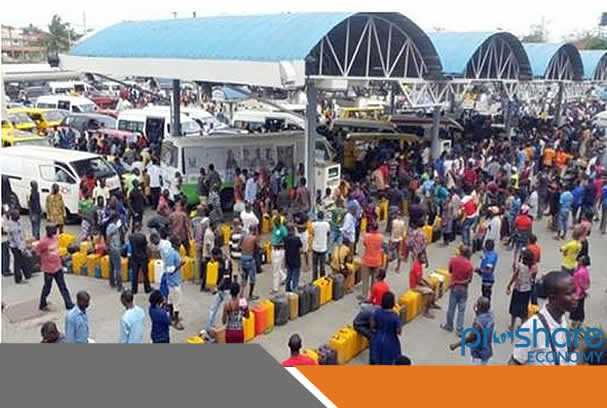Being an Analyst Note issued by Proshare Research on December 1st 2022
No Respite from Fuel Scarcity
Breaking the long chain of silence, the Nigerian National Petroleum Company (NNPC) Limited and the Nigerian Midstream and Downstream Petroleum Regulatory Authority (NMDPRA) have reacted separately to the petrol scarcity in the country. The NNPC Ltd blamed the scarcity largely on ongoing road projects around Apapa and other access roads to parts of Lagos depots. The company hopes for normalcy soon, having channelled vessels and trucks to unrestrained depots with many load outs. The NMDPRA attributed the scarcity indirectly to panic buying, diversion, and hoarding, noting that it has no intention of increasing the petrol pump price during the festive period as there is enough petrol for 34 days. Analysts believe the silence of the regulator in restating its specific approved petrol price signals its comfort with the new pricing model. Increasing supply without resolving the legacy issues of market distortion would constantly bring fuel scarcity to the country.
Insecurity Rationalises the Gains from Nigeria's Blue Economy
The Executive Secretary of the Nigerian Shippers Council, Emmanuel Jime, at the ongoing National Transport Summit of the Chartered Institute of Transport Administration, stated that shippers were paying high freight costs on goods because of the country's poor security rating. Shedding light on the issue, the Executive Secretary noted that the insecurity in the Niger Delta waterways meant cargoes bound for the eastern ports diverted to Lagos as the differential between the war risk premium of cargoes bound for the two parts of the country increased. Analysts note that the insecurity concerns transcend the water transport sector, recalling that the Abuja-Kaduna railway line has not been operational for months due to a recent terrorist attack that saw some passengers killed and others kidnapped. Analysts say that if the security situation across the country continues, the government's efforts at upgrading the ports in the Eastern parts of the country will yield little results. Due to congestion, over 8,000 cargoes are stranded in the country's seaports.
Domestic Oil Refining in H1 2023 Hangs in the Balance
Ending the importation of petroleum products might not be feasible again in the first half of 2023. The Nigerian Minister of State for Petroleum Resources, Timipre Sylva, has disclosed that Nigeria will exit importing petroleum products possibly in the third quarter of next year in a worst-case scenario but much earlier in a base-case scenario. Based on antecedent, Analysts noted that the Minister's statement is a subtle way of shifting the responsibility to the next administration. Although analysts expect the country to become a refining hub with the onboarding of its many refineries, it is more of a medium-term prospect than a quick fix.
CBN Spends US$11.42bn to Defend Naira between January and July
CBN has spent a total of US$11.42bn in ensuring exchange rate stability at the authorized currency windows between January and July 2022, a +6.23% rise from $10.75bn in the corresponding period of 2021. This year's substantial gains in the dollar have lessened the currency's value, pulling the naira down to a record low at the parallel market. The CBN spent US$4.86bn in Q1 2022 and a lower amount of $4.81bn in Q2 2022. The amount of forex sold for this period has been on a downtrend, monthly, -15.4% decline to US$1.750bn in July from US$2.07bn in June.
Reviewing the windows, the interbank/invisible market and matured Swaps fell by -22.0% and -59.1%, respectively, in July, to US$0.13 billion and US$0.27 billion, below their respective levels in June. However, the Investors and Exporters (I&E), Secondary market Intervention Sales (SMIS), and Small and Medium Enterprises (SME) windows rose by 5.8%, 0.6%, and 65.7% to US$0.44bn, US$0.72bn, and US$0.19bn in July. The CBN intervention has depleted the external reserves to US$37.12bn from US$40bn in 2021 despite ending forex sales to Bureaux De change in July 2021. Analysts expect the forex sales for the remaining months to be higher as the naira's depreciation worsened recently, with N444.62 at the NAFEX fixing and N445.30 at the I&E fixings as of November 30, 2022, compared to N418.45 and N419.50 as of June 30, 2022.
The Nigeria Equity Market Experienced a Bullish November
The NGX ASI closed the month of November at 47,660.04 index points, representing a month-on-month (MoM) increase of +8.02% and an improved Yield-to-Date (YTD) of +11.57%. Sectoral performance was largely positive, with thirteen (13) sectors recording positive, three (3) sectors negative, and one (1) sector closed flat. The Industrial sector topped the gainers' chart with 13.17% MoM, with buy interest in BUA Cement recording a 10.00% increase in its share price to close the month at N77.00 per share as against N70.00 the previous month. The Oil and Gas sector topped the losers' chart, losing -8.12% MoM, with Seplat Energy recording a -12.5% decline in its share price to close at N1,050 per share as against the N1200 recorded the previous month. As against analysts' expectation, the Nigeria Equity market experienced renewed buy interest despite the Central Bank of Nigeria's (CBN's) hawkish increase in the Monetary Policy rate (MPR), raising inflation and slowing GDP growth MoM. Analysts expect a halt in buying interest towards the end of Q4 2022 as the festive season sets in and election campaigns affect the market (see table 1 below).
Table 1:
FG To Earn N28m Revenue from Satellite Internet Broadband Project
The Nigerian government has announced the concession of research and development of a satellite internet broadband project which would bring revenue of N28bn to the country and create over 10,000 direct and indirect jobs over 15 years. The concession also targets the deployment of over 7,000 small aperture terminals all over Nigeria over the next two years, using a Design and Finance Build, Operate and Transfer (DFBOT) Private Public Partnership (PPP) model. The project owner is the National Space Research and Development Agency, an agency under the supervision of the Infrastructure Concession Regulatory Commission (ICRC). This was disclosed by Mr. Manji Yarling, Acting Head, of Media and Publicity, at the ICRC.
Analysts believe telcos can leverage the satellite project to cover areas their 5G network could not reach. This would improve fixed broadband penetration, help fight insecurity, mitigate the effect of climate change, aid in disaster relief, and improve healthcare services, especially for Nigerians in rural areas.
 Lagos, NG • GMT +1
Lagos, NG • GMT +1











 222 views
222 views





















 Sponsored Ad
Sponsored Ad
 Advertise with Us
Advertise with Us









